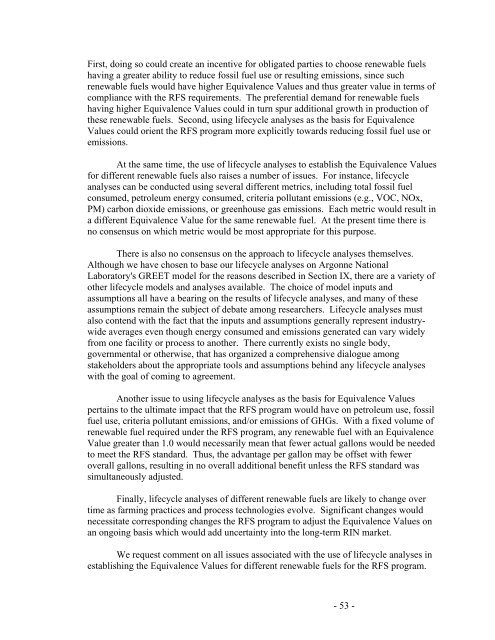Regulation of Fuels and Fuel Additives: Renewable Fuel Standard ...
Regulation of Fuels and Fuel Additives: Renewable Fuel Standard ...
Regulation of Fuels and Fuel Additives: Renewable Fuel Standard ...
Create successful ePaper yourself
Turn your PDF publications into a flip-book with our unique Google optimized e-Paper software.
First, doing so could create an incentive for obligated parties to choose renewable fuels<br />
having a greater ability to reduce fossil fuel use or resulting emissions, since such<br />
renewable fuels would have higher Equivalence Values <strong>and</strong> thus greater value in terms <strong>of</strong><br />
compliance with the RFS requirements. The preferential dem<strong>and</strong> for renewable fuels<br />
having higher Equivalence Values could in turn spur additional growth in production <strong>of</strong><br />
these renewable fuels. Second, using lifecycle analyses as the basis for Equivalence<br />
Values could orient the RFS program more explicitly towards reducing fossil fuel use or<br />
emissions.<br />
At the same time, the use <strong>of</strong> lifecycle analyses to establish the Equivalence Values<br />
for different renewable fuels also raises a number <strong>of</strong> issues. For instance, lifecycle<br />
analyses can be conducted using several different metrics, including total fossil fuel<br />
consumed, petroleum energy consumed, criteria pollutant emissions (e.g., VOC, NOx,<br />
PM) carbon dioxide emissions, or greenhouse gas emissions. Each metric would result in<br />
a different Equivalence Value for the same renewable fuel. At the present time there is<br />
no consensus on which metric would be most appropriate for this purpose.<br />
There is also no consensus on the approach to lifecycle analyses themselves.<br />
Although we have chosen to base our lifecycle analyses on Argonne National<br />
Laboratory's GREET model for the reasons described in Section IX, there are a variety <strong>of</strong><br />
other lifecycle models <strong>and</strong> analyses available. The choice <strong>of</strong> model inputs <strong>and</strong><br />
assumptions all have a bearing on the results <strong>of</strong> lifecycle analyses, <strong>and</strong> many <strong>of</strong> these<br />
assumptions remain the subject <strong>of</strong> debate among researchers. Lifecycle analyses must<br />
also contend with the fact that the inputs <strong>and</strong> assumptions generally represent industrywide<br />
averages even though energy consumed <strong>and</strong> emissions generated can vary widely<br />
from one facility or process to another. There currently exists no single body,<br />
governmental or otherwise, that has organized a comprehensive dialogue among<br />
stakeholders about the appropriate tools <strong>and</strong> assumptions behind any lifecycle analyses<br />
with the goal <strong>of</strong> coming to agreement.<br />
Another issue to using lifecycle analyses as the basis for Equivalence Values<br />
pertains to the ultimate impact that the RFS program would have on petroleum use, fossil<br />
fuel use, criteria pollutant emissions, <strong>and</strong>/or emissions <strong>of</strong> GHGs. With a fixed volume <strong>of</strong><br />
renewable fuel required under the RFS program, any renewable fuel with an Equivalence<br />
Value greater than 1.0 would necessarily mean that fewer actual gallons would be needed<br />
to meet the RFS st<strong>and</strong>ard. Thus, the advantage per gallon may be <strong>of</strong>fset with fewer<br />
overall gallons, resulting in no overall additional benefit unless the RFS st<strong>and</strong>ard was<br />
simultaneously adjusted.<br />
Finally, lifecycle analyses <strong>of</strong> different renewable fuels are likely to change over<br />
time as farming practices <strong>and</strong> process technologies evolve. Significant changes would<br />
necessitate corresponding changes the RFS program to adjust the Equivalence Values on<br />
an ongoing basis which would add uncertainty into the long-term RIN market.<br />
We request comment on all issues associated with the use <strong>of</strong> lifecycle analyses in<br />
establishing the Equivalence Values for different renewable fuels for the RFS program.<br />
- 53 -
















